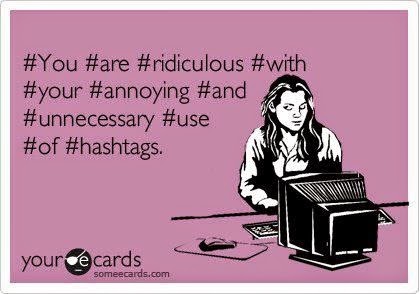Every good struggle needs a slogan.
Civil Rights, Womens Sufferage, etc. It helps to summarize what your
cause stands for or is fighting for. It's a short introduction to the
struggle for beginners and a rally cry. 5440 or Fight. Remember theAlamo. Yes We Can. Where's the Beef? Why not us?
With the advent of social media these
slogans have become broader and deeper rally cries. News stories that
break in third world countries are posted and hashtagged to make it
easier to follow as things develop. Social movements are tagged so
like minded people can get involved with the movement and keep up
with what is happening. Even brands get tagged so advertisers can
follow what is being said about that particular brand. Hashtags serve
a purpose in that they help to catalog and categorize the vast and
sprawling information on social media sites. They serve a purpose.
#yum#foodporn#lunch#sohungry that you
just tagged that selfie of you and your sushi with serves no purpose
what so ever. The paragraph of hashtags that you posted with that
blurry picture of the sunset may tell some sort of story, but it
takes more effort to read than a Thomas Piketty economics book. It
doesn't help and in fact is may actually do damage to the english
language.
When you condense entire ideas and
thoughts down to a few words proceeded by a hashtag you begin to
circumvent language. Don't waste time using the words you want to
say, use a hashtag people will recognize and maybe you'll get a few
more likes or retweets. If you take the time to snap a picture, post
it on the internet, and even hashtag the life out of it; spend a few
more moments to, instead, write some nice words and share your
thoughts. Most of us are capable of independent thought, why not
express it and share it. I, for one, would find it more interesting
than one more selfie that looks exactly like the last twenty you
posted only in a different location.
When George Orwell wrote his futuristic
dystopian novel 1984 he
included an idea called Newspeak. It was an effort by the government
to dilute and simplify language down to short phrases for larger
concepts, to make
conversations more efficient less prone to confusion. It was also a
way to keep people from developing more complex ideas that may cause
them to question the powers that be. I don't think for one second
that social media and hashtags specifically are some sort of
government conspiracy, however the paralles between the use of
hashtags and Newspeak are eerie and I'm not the first one to come to
this conclusion either.
I'm sure I sound
like a grumpy old man complaining about “kids these days” and
that may be true, but my distaste for hashtags is part serious and
part fun. There should always be people who point out the absurdity
of popular things, much like pointing out that the emperor has no
clothes. I'm sure that my distaste for social media will be pointed
out again and again on all the social media sites I post to. Hashtag
abuse is part of a larger and more serious problem: the willful
dumbing down of society.
.jpg)



